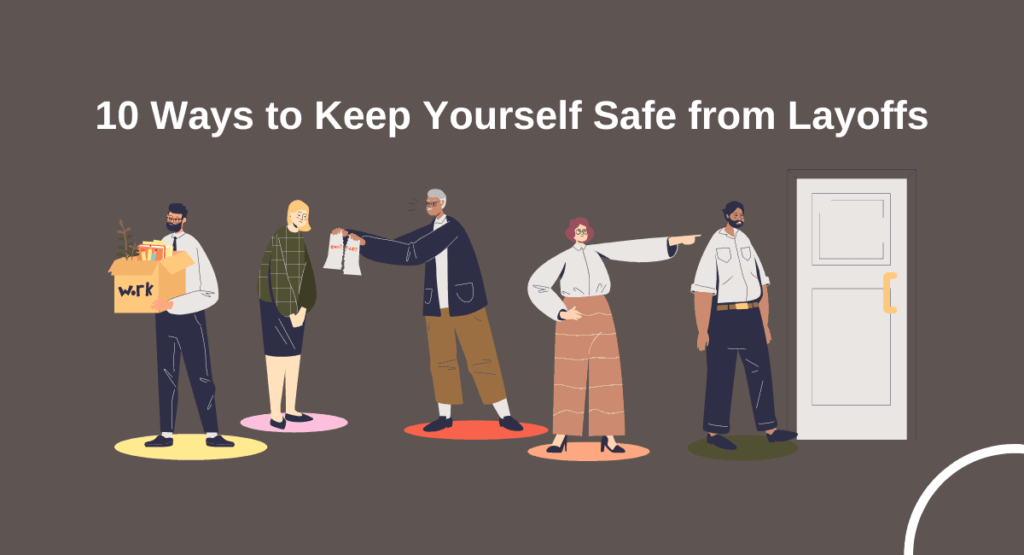10 Ways to Keep Yourself Safe from Layoffs


Nobody wants to get laid off. It’s a challenging process that can often lead to great stress and uncertainty.
If you’re worried about layoffs at your job, don’t worry – we’re here to help!
This blog post will go through 10 ways to ensure your job is secure and minimize the danger of losing it.
Keep reading for more information!
Identify your company’s risk factors.
Layoffs, economic recession, natural disasters, and changes in consumer tastes are among the factors that can affect a company’s business.
Some steps to mitigate the impact, for example, companies can minimize layoffs by offering early retirement packages or voluntary layoffs.
Employees affected by layoffs often feel insecure and anxious, leading to decreased productivity. To mitigate this risk, companies can offer severance packages and outplacement services.
Natural disasters can disrupt supply chains and damage property, but companies can reduce their impact by diversifying their supplier base and maintaining comprehensive insurance coverage.
Finally, changes in consumer tastes can erode sales and market share, but companies can save their business by constantly monitoring trends and customer preferences.
By identifying and addressing these risks, you can prepare the impact on the employer’s business.
Mitigate your risk factors

Several steps that employees can take to help mitigate the risk of layoffs. Some of these steps include:
- Being proactive and identifying your company’s risk factors.
- Take measures to reduce these risks’ impact, such as through layoffs prevention or insurance.
- Monitoring trends and customer preferences to stay ahead of the curve.
By being proactive and taking measures to reduce your company’s risk factors, you can help to secure your job and protect yourself from layoffs.
The Dangers of layoffs
Layoffs are a danger that all employees face. A company may lay off employees for some reasons, including economic downturns or to improve the company’s bottom line.
When a company lays off its employees, it can have a devastating impact on those workers. They may lose their income and their health insurance. They may also lose their job security and their retirement savings.
Layoffs can also harm the company’s morale and reputation. Employees laid off may feel betrayed by the company and may be less likely to recommend it to others.
How to Secure Your Job

With rising interest rates and an increasing global workforce, securing your job during a recession can be challenging. Here are the ways you can do to increase your chances of keeping your job during tough economic times:
Update your skillset
It’s crucial to stay up-to-date on your industry. This means keeping abreast of changes in the marketplace and being able to adapt your skills to meet the needs of the times.
Additionally, staying current on industry news and trends will make you more valuable to your employer and less likely to be replaced by someone with less experience.
Stay connected with your professional network.
It’s essential to build strong relationships with your co-workers and superiors. During a recession, companies are forced to make cuts. Those with strong relationships with their colleagues are more likely to be kept on during downsizing.
Furthermore, building good relationships with those in charge will make you more likely to be considered for promotions or raises when the economy improves.
Get more out of your business
Get the best employee engagement content every week via mailing list
Maintain a positive attitude
A good attitude is one of the essential employability skills you’ll ever need. It is the foundation for good work performance and successfully managing your career.
It also affects every aspect of your life, from your interactions with family and friends to your ability to manage stress and stay healthy. Therefore, it is essential to learn how to maintain a positive attitude.
Here are some tips:
- Take responsibility for your happiness.
- Focus on the things you can control in your life.
- Surround yourself with positive people.
- Look for the good in every situation.
- Practice gratitude.
By following these tips, you can develop and maintain a positive attitude that will serve you well in all areas of your life.
Don’t be afraid to ask for help.
It can be challenging to ask for help, especially when you’re used to being independent. However, there’s no shame in admitting that you need assistance.
Whether you’re struggling with a work project or personal issue, asking for help allows you to focus on what’s essential and get the best possible results. When you’re overwhelmed, reach out to a friend, colleague, or professional for support.
You might be surprised at how willing they are to lend a hand. Remember, everyone needs assistance from time to time. Asking for help is a sign of strength, not weakness.
Take care of yourself both physically and mentally.

In today’s high-stress world, taking care of yourself physically and mentally is more important than ever.
Your employer may require you to sit at a desk all day, but that doesn’t mean you can’t find time for some physical activity. Taking a brisk walk during your lunch break or going for a jog in the morning can boost your energy levels and overall health.
It’s also essential to make time for activities that help you to relax and de-stress. Whether reading, listening to music or spending time with friends and family, taking time out for yourself help you stay focused and motivated at work.
By taking care of yourself, you’ll be able to perform your best at work and in your personal life.
Continue learning and growing as an individual.
You must continue learning and growing as an individual. You can do this by seeking new opportunities and experiences and challenging yourself to stretch beyond your comfort zones.
It’s also helpful to take some time to reflect on what you’ve learned and how you’ve grown.
Of course, learning and growth are lifelong processes, so there’s always room for improvement! You can make the most of your lives and reach your full potential by taking steps to continue learning and growing.
Don’t spread rumors or gossip about others in the office.
Have you ever been the subject of office gossip? It’s not a fun experience. Gossip and rumors can spread quickly in an office. It can be hard to stop it from spreading, but you should try. If you don’t, everyone will talk about you in no time.
And not in a good way. Not only is it hurtful to be the subject of gossip, but it can also damage your relationships with your co-workers. If you’re spreading rumors, Others will likely view you as untrustworthy and disloyal.
So the next time you’re tempted to repeat something you’ve heard about a co-worker, think twice. Not only could you be seriously damaging that person’s reputation, but you could also be harming your standing in the office.
Dress for success – look put together and neat, even on casual days.
In the workforce, first impressions are essential. Your appearance impacts how people perceive you and can shape their beliefs. To be taken seriously at work, you must dress for success.
It is essential always to look put together and professional, even on casual days.
Neatness counts
Ensure your clothes are clean and wrinkle-free. Avoid wearing anything too revealing or casual, like workout clothes or pajamas. And take care when choosing accessories.
Keep it simple
Avoid anything that could be considered disruptive or distracting. By dressing for success, you’ll message that you’re serious about your work and committed to providing quality service.
Stay organized and keep track of your work goals.
Organization and goal setting are important aspects of any successful career. By being aware of your goals and keeping track of your progress, you can ensure that you are always moving forward.
Goal setting also allows you to measure your progress and identify areas where you need to improve. Additionally, staying organized can reduce stress and increase your productivity.
When you know what needs to be done and have a plan for how to do it, it becomes much easier to get the work done efficiently. Therefore, if you want to be successful in your career, stay organized and keep track of your work goals.
Be flexible and adaptable.
In today’s employment market, flexibility and adaptability are more important than ever. Companies are constantly changing and evolving, and employees need to be able to keep up.
That means being willing to try new things and learn new skills. It also means being open to change, whether it’s a change in job duties or a change in company policy.
Employees who are inflexible and set in their ways will find it challenging to keep up with the pace of change and may eventually find themselves out of a job. On the other hand, those who are flexible and adaptable will be able to ride the wave of change and come out ahead.
Therefore, it’s essential to stay flexible and adaptable to stay employed.
Finally, it’s crucial to be proactive about your career. This means taking steps to improve your skillset and keeping an eye out for new opportunities.
By being proactive, you’ll show that you’re committed to your career and are willing to go the extra mile to succeed.
The Importance of Staying Positive During a Layoff

Layoffs can be a scary thing. But, if you know how to protect yourself, you can minimize the risk of being laid off from your job.
Always stay updated on company news and developments. This way, you’ll be able to anticipate any potential layoffs coming down the pipeline.
Be upbeat at work. Positivity is contagious, and staying positive will make you more attractive to employers.
Focus on your work and don’t get involved in office politics. By staying out of the drama, you’ll increase your chances of keeping your job during a layoff.
Always be prepared for the worst. Being prepared will minimize the impact a layoff can have on your life.
Losing a job is never easy. You can follow the above strategy to increase your chances of keeping it.
Research your industry and keep up to date on changes
The economy can be unpredictable at best, and when it takes a turn for the worse, it can be tough to keep your job – no matter how qualified you may be.
You can stay afloat is to being flexible with work hours and being willing to relocate for the right opportunity. Additionally, networking is a must. Be sure to reach out to people in your industry and build relationships that can help you during tough times.
You should maintain a positive attitude and focus on job skills rather than salary negotiations. Finally, do your research regarding your industry – changes happen quickly, and staying up-to-date will help you stay afloat during tough times.
Prepare yourself for a job change.
In today’s economy, it’s not unusual for companies to lay off employees. This must be a tough time for everyone, but it’s especially tough for unprepared people.
Here are four tips that will help you weather the storm and keep your job:
1. Create a business case for your job – it will help you justify any potential changes or layoffs.
2. Ensure you have a backup plan in place.
3. Stay current with industry trends and keep up with new technology developments.
4. Ask your boss if you can take on additional responsibilities or projects during these challenging times – they may be more than willing to help!
Frequently Asked Questions
Should I take a pay cut to keep my job?
It depends on your specific situation. Your job title, salary, company size, and experience should be considered.
How can I keep my skills up to date, so I’m employable in any economy?
You can take classes or courses, join professional organizations, and participate in extracurricular activities.
How can I find new opportunities when the economy tanks?
You can use a professional network. You can attend job fairs, meet friends at social events, or participate in online job forums.
Conclusion
The job market is changing, and how we keep our skills sharp. Keep learning and stay ahead of the curve.
Technology changes quickly, so constantly updating your skillset is essential. That way, you can feel confident that you’re doing everything possible to keep yourself safe from losing your job.


